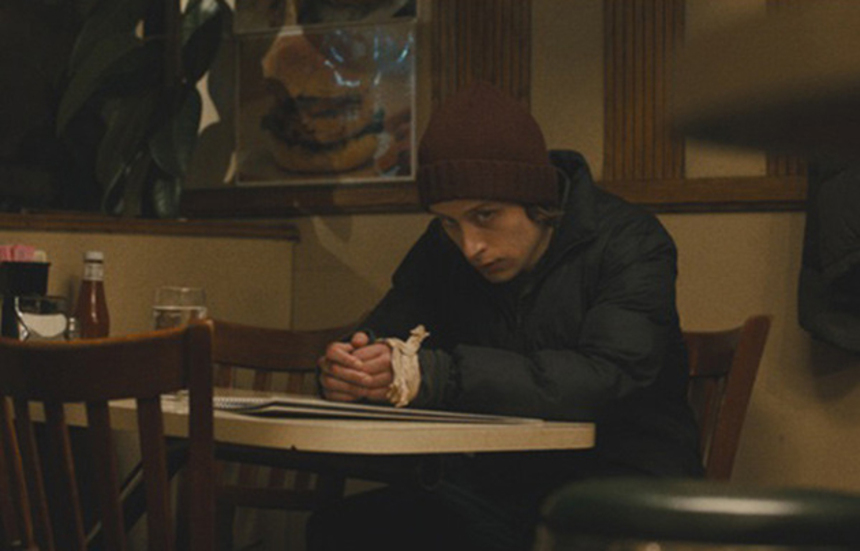Tribeca 2014 Interview: Rory Culkin Shines Dark in Lou Howe's GABRIEL

Lou Howe's directorial debut follows Gabriel (Rory Culkin), a scared 20-something suffering from a non-specific mental illness slinging fault in every direction, including his own, after his father commits suicide prior to the film's start. To anyone who has experienced even the slightest bout of depression, this sometimes quiet, sometimes frantic observational story will surely hit home. And although the motivation for writing the film didn't come from Howe's home, it came from nearby.
"I'd had a friend who was diagnosed with a mental illness in his late teens," explains Howe as we sit with lunch-gone-cold in front of us at The Carlton in Manhattan during the first days of the Tribeca Film Festival. "That's when the seed [for the story] was planted. I started thinking about his experience of the world and from that created this fictional character. I became really got obsessed with [my friend's] experience of the world and the story sort of grew organically from [the character I created] Gabe. I couldn't shake him really."
Watching the movie, you can't shake Gabe either. Culkin's expert performance of a boy on the edge - of what, we don't know - draws you in and keeps you present for a gloomy 90 minutes. The ending comes somewhat abruptly, which was a note Howe had gotten in the writing stages.
"For me it's the right place to leave Gabe emotionally," he says. "The style of storytelling is hopefully very experiential, that I'm not telling them much but rather showing it to them. The idea of 'wrapping it up' or an explanation of how everyone's doing, never really felt right."
When Culkin met with Howe after reading the script, the two were on the same page - pun intended. Once in the swing of prep for the shoot in New York City and The Hamptons, Culkin and Howe met with others who'd experienced depression, mental illness, suicide attempts and Culkin even read a few books on the subject.
"It was good to learn about the medical side of mental illness," he says, eyes cast down the whole time, "but as soon as we started shooting I had to brush that aside because Gabriel doesn't believe in that. It quickly became how Gabriel is feeling, how he doesn't trust anyone around him and really doing this from his perspective."
As Gabriel, although unstable and obviously tortured by his own demons, Culkin seems stronger and more convicted than the real-life counterpart sitting in front of me. His big, round eyes are what draw you in during the film and make you root for the angry child inside, but are sadly nowhere to be seen during the interview. However, he perks up when asked whether there's a shadow he might have to come out from under as the 24-year-old younger brother of Macauley and Kieran Culkin.
"If anything I want to enhance the name... I want to make the family proud!"
Howe feels that the reason the two connected so well and understood Gabriel was because of Culkin's interiority, which as I said was palpable during the brief meeting.
"He is so internally focused," says Howe, a graduate from American Film University in 2010. "We could talk about everything that is going on in the character's mind and then let him loose. Both of us trust that whatever comes out will come out. And that's absolutely the character's experience of the world - deep in his own head - but also in my experience the best way to create a character. You're building a full person and presenting them however they appear, instead of worrying how they appear. It added a whole new dimension to Gabe and we really connected to that."
In a very honest moment, Culkin describes his acting experience on set - the first he's carried as the lead on his own, appearing in every scene throughout.
"I wish I were stronger," he says. "I wish I could get on set and crack jokes and then just turn it on when I have to. But it does take a while to get it going and Lou and the crew were really sensitive to that as well.
Howe's description of Culkin as internal is probably most apt when considering this is his first film as sole lead, where he essentially has to carry the entire story. But he feels "there is pressure only if you over think it." (Strength shown from the inside out.)
"It was all about keeping my eye on the ball," he continues, "and not really looking from the outside. If I did take a second to think about what I was doing, I would've probably crumbled, but then again that might've been appropriate [to the story]. No, there was no pressure, and I felt the crew protected me from it [if there was]."

Do you feel this content is inappropriate or infringes upon your rights? Click here to report it, or see our DMCA policy.






